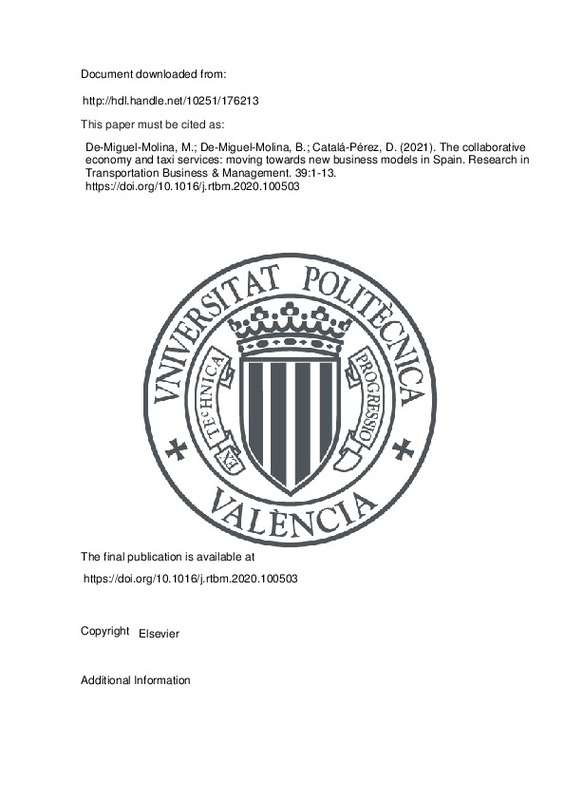JavaScript is disabled for your browser. Some features of this site may not work without it.
Buscar en RiuNet
Listar
Mi cuenta
Estadísticas
Ayuda RiuNet
Admin. UPV
The collaborative economy and taxi services: moving towards new business models in Spain
Mostrar el registro sencillo del ítem
Ficheros en el ítem
| dc.contributor.author | de-Miguel-Molina, María
|
es_ES |
| dc.contributor.author | de-Miguel-Molina, Blanca
|
es_ES |
| dc.contributor.author | Catalá-Pérez, Daniel
|
es_ES |
| dc.date.accessioned | 2021-11-05T13:12:31Z | |
| dc.date.available | 2021-11-05T13:12:31Z | |
| dc.date.issued | 2021-06 | es_ES |
| dc.identifier.issn | 2210-5395 | es_ES |
| dc.identifier.uri | http://hdl.handle.net/10251/176213 | |
| dc.description.abstract | [EN] The collaborative economy brings new business models through digital platforms which compete with services that have traditionally been highly regulated. This is the case of the taxi sector. The new business models that have emerged in private passenger transport are mainly based on the customisation opportunities provided by big data, yet the traditional business model followed by the taxi sector is finding it difficult to adapt to these changes in order to remain competitive, as we can observe from a content analysis of news over the last year in Spain. In this paper, we analyse the need to raise these issues through a governance model in which all stakeholders can express their opinions, trying to achieve solutions based on consensus for real deregulation. In order to achieve this consensus, government will need to play a crucial role, despite the fact that it has recently transferred decision-making to regional and local governments. | es_ES |
| dc.description.sponsorship | This work has been developed within the Prometeo Research Project for Excellence programme "The regulation of the digital transformation and the collaborative economy", conducted by Prof. Lorenzo Cotino Hueso and with the participation of Prof. Maria de Miguel, among others (PROMETEO/2017/064, Valencian Regional Government) . | es_ES |
| dc.language | Inglés | es_ES |
| dc.publisher | Elsevier | es_ES |
| dc.relation.ispartof | Research in Transportation Business & Management | es_ES |
| dc.rights | Reconocimiento - No comercial - Sin obra derivada (by-nc-nd) | es_ES |
| dc.subject | Collaborative economy | es_ES |
| dc.subject | Passenger transport | es_ES |
| dc.subject | Business model | es_ES |
| dc.subject | Stakeholders | es_ES |
| dc.subject | Regulation | es_ES |
| dc.subject | Government | es_ES |
| dc.subject.classification | ORGANIZACION DE EMPRESAS | es_ES |
| dc.title | The collaborative economy and taxi services: moving towards new business models in Spain | es_ES |
| dc.type | Artículo | es_ES |
| dc.identifier.doi | 10.1016/j.rtbm.2020.100503 | es_ES |
| dc.relation.projectID | info:eu-repo/grantAgreement/MECD//FPU15%2F03926/ES/FPU15%2F03926/ | es_ES |
| dc.relation.projectID | info:eu-repo/grantAgreement/Generalitat Valenciana (Prometeo)//PROMETEO%2F2017%2F064//La regulación de la transformación digital y la economía colaborativa/ | es_ES |
| dc.rights.accessRights | Abierto | es_ES |
| dc.contributor.affiliation | Universitat Politècnica de València. Departamento de Organización de Empresas - Departament d'Organització d'Empreses | es_ES |
| dc.description.bibliographicCitation | De-Miguel-Molina, M.; De-Miguel-Molina, B.; Catalá-Pérez, D. (2021). The collaborative economy and taxi services: moving towards new business models in Spain. Research in Transportation Business & Management. 39:1-13. https://doi.org/10.1016/j.rtbm.2020.100503 | es_ES |
| dc.description.accrualMethod | S | es_ES |
| dc.relation.publisherversion | https://doi.org/10.1016/j.rtbm.2020.100503 | es_ES |
| dc.description.upvformatpinicio | 1 | es_ES |
| dc.description.upvformatpfin | 13 | es_ES |
| dc.type.version | info:eu-repo/semantics/publishedVersion | es_ES |
| dc.description.volume | 39 | es_ES |
| dc.relation.pasarela | S\413343 | es_ES |
| dc.contributor.funder | MINISTERIO DE EDUCACION | es_ES |
| dc.contributor.funder | Generalitat Valenciana (Prometeo) | es_ES |
| dc.subject.ods | 08.- Fomentar el crecimiento económico sostenido, inclusivo y sostenible, el empleo pleno y productivo, y el trabajo decente para todos | es_ES |
| dc.subject.ods | 09.- Desarrollar infraestructuras resilientes, promover la industrialización inclusiva y sostenible, y fomentar la innovación | es_ES |
| dc.subject.ods | 11.- Conseguir que las ciudades y los asentamientos humanos sean inclusivos, seguros, resilientes y sostenibles | es_ES |







![[Cerrado]](/themes/UPV/images/candado.png)

